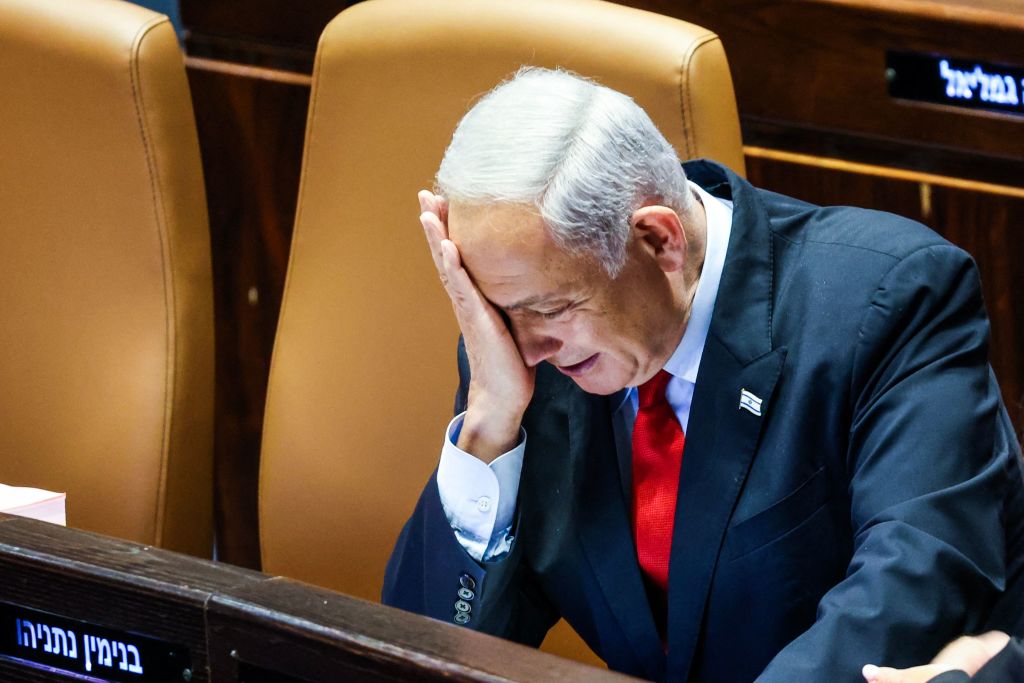Benjamin Netanyahu’s government is looking increasing precarious as international opposition grows. When I went to Friday night dinner at my in-law’s last week, everyone was gripped by the Israeli Supreme Court’s decision to remove state funding from Orthodox Yeshivas, unless they break their 76-year practice of refusing to enlist in the military.
The court ruled that as of 1 April, ultra-Orthodox schools will no longer receive any state funds unless they allow their students to serve in the IDF, as all other Jewish Israelis must do.
This marks the end of the uneasy status quo that’s existed since the formation of Israel. Back in 1947, the then chairman of the Jewish Agency, David Ben Gurion wrote a letter to Haredi representatives reassuring them that his new state would allow a separate education system for the ultra-Orthodox society. In 1949, as Prime Minister, Ben-Gurion officially exempted yeshiva students from military service. Ben-Gurion later regretted it.
This has always caused resentment among the broader population. The dispute has become particularly contentions in recent years as the ultra-Orthodox, who tend to have much larger families, have grown in population compared to secular Israelis.
Since 7 October there has been growing anger from all parts of secular society at their continuing exemption. As one columnist in the liberal newspaper Haaretz put it, the issue ‘is not about taxes that can be increased or decreased. It is not about a budget that can be given or cancelled, this is an irreversible and eternal thing’; for most Israelis the chance of dying in the military or having your child die is an unavoidable risk of citizenship, but ‘the ultra-Orthodox are exempt from this death’.
The response from leaders of the Haredim usually fails to help their case: rather than focus on more prosaic objections to their enlistment, they put forward theological arguments that carry increasingly little weight.
Aryed Deri, leader of the Shas party, which represents the Mizrachi ultra-Orthodox, lamented that it was ‘precisely in the days when the people of Israel need the mercy of heaven in the south and in the north’ that the court adopts this ‘offensive attitude towards the Torah scholars on whom the world stands’.
Deri went on to call the ruling ‘a sign of Cain’ and ‘an unprecedented’ insult against the ultra-Orthodox by the Jewish state.
According to one article in Yeded Na’im, the newspaper of the Lithuanian Haredim, while it is the role of secular Jews fighting in the IDF to preserve ‘the Israeli people’, the ultra-orthodox had the role of preserving ‘the Jewish people, which is the most important, most existential role’.
Last November one Rabbi went so far as to say that the ultra-Orthodox should be grateful to the IDF in the same way that they were grateful to the bin men ‘who collect the garbage every morning’.
These statements have not endeared the ultra-Orthodox to the broader Israeli public – and they obscure the real and growing division between the attitudes of rabbis and political leaders and the wider Haredi community.
According to polling by the Viterbi Center, between 2012 and 2018 found that only one tenth of ultra-Orthodox believed their military exemption should end – but a new poll conducted after the October attacks found that number had increased to 22 per cent.
Today you can see videos on social media of Haredi in uniform being applauded in their communities. According to Dr Nechumi Yaffe of Tel Aviv University, ‘They used to not let a soldier in uniform enter the synagogue’, but ‘now they do’.
All this spells more bad news for Netanyahu. Protecting the ultra-Orthodox from enlistment was one of the pins holding his fragile coalition together. The court ruling has taken this away from him.
Bibi had previously argued that those yeshiva students who had not yet received a call up to enlist should continue to receive funding, that the court’s decision would lead to the closing of hundreds of schools, and called for a 30 days’ grace period to formulate a new law to manage the transition from ultra-Orthodox exemption to service.
Now he is attempting to pass emergency legislation to extend the exemption, but the court ruling has made his grip on power even more precarious. The crowd of over ten thousand who camped outside the Knesset in the most recent protest included the families of the remaining hostages, secular Israelis angry at his attempts to maintain the ultra-Orthodox exemption, and people of diverse politics who just hate Bibi.
In an attempt to get the emergency legislation through the Knesset, Netanyahu has apparently been in negotiation with Palestinian MKs to persuade them to abstain from the vote. This desperate measure perfectly encapsulates the bind Bibi is in: already dependent on the ultra-Orthodox and the religious right, he is now forced to make overtures to the Arab parties in order to survive.
The ruling has made a bad situation even worse for Bibi, and it will have massive and unexpected ramifications in terms of Israeli politics, not merely in terms of topping the Netanyahu government, but by expanding a secular-religious rupture in Israeli society that hasn’t been seen before.







Comments